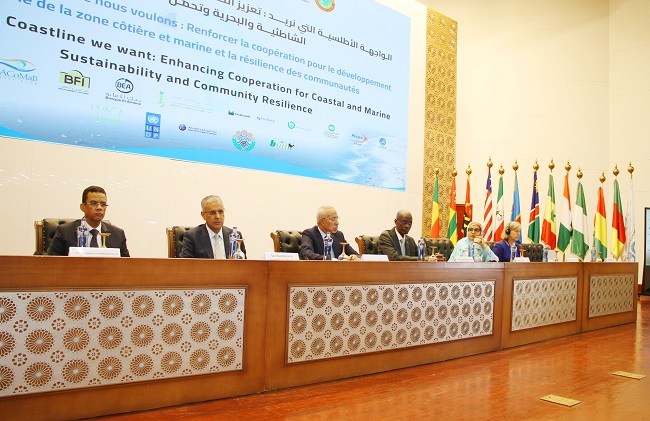The Fourteenth Conference of the Parties (COP14) of the Abidjan Convention opened on Wednesday, May 21, 2025, in Nouakchott, Mauritania, with a call on Contracting Parties to ratify four additional Protocols.

Whie welcoming participants to the conference, Mr. Mamadou Kane, Executive Secretary of the Abidjan Convention, said in his opening speech that COP14, with the theme “Towards a resilient Atlantic Coast: Enhancing cooperation for the sustainable development of marine and coastal areas and the resilience of our coastal communities”, speaks volumes about the Secretariat’s vision in its ambition to address the major current and future environmental challenges of marine and coastal areas facing the Abidjan Convention region.
In this perspective, he added that the Convention provides Contracting Parties with cooperation tools to combat the triple planetary crisis of climate change, biodiversity loss and pollution.
Kane said: “Already, four Additional Protocols: the Bassam Protocol on pollution from land-based sources and activities, the Malabo Protocol on environmental standards associated with offshore oil and gas activities, the Pointe- Noire Protocol on integrated coastal zone management and the Calabar Protocol on sustainable mangrove management. Contracting Parties are strongly encouraged to ratify them in order to harmonise the Convention’s coastal and marine governance policies. Another Additional Protocol on the Management of Marine Protected Areas is being finalised.”
According to him, the Secretariat supports the Contracting Parties in the adoption of the Kunming-Montreal Global Framework, which provides for the conservation of 30% of terrestrial, inland waters, coastal and marine areas by 2030, and the restoration of 30% of degraded ecosystems, all of which aim to halt and reverse the loss of biodiversity.
Kane added: “It also supports them in the signing and ratification of the BBNJ agreement to provide an appropriate and cooperative response to the loss of biological diversity and the degradation of ocean ecosystems in areas beyond the limits of national jurisdiction.
“The Secretariat also accompanies and urges Contracting Parties to use all their weight to reach an agreement at the next session of the Intergovernmental Negotiating Committee for an international legally binding instrument on plastic pollution including the marine environment.
“Support to Contracting Parties for these global initiatives aims to harmonise and coordinate the fight against challenges not only at the level of Contracting Parties but well beyond the Convention areas to further ensure its security and resilience.
“All these actions are carried out through projects and programmes with the support, collaboration and cooperation of numerous partnerships such as UEMOA, PRCM, IUCN, AU-IBAR, SST, IOI, CSE, ECOWAS, the FAO and the Regional Seas Conventions to implement its COP programmes and decisions. The Secretariat thanks its partners and plans to strengthen these collaborations for greater synergies.”
In her presentation, Mrs. Susan Gardner, Director of the Ecosystems Division of the United Nations Environment Programme (UNEP), listed key successes of the Abidjan Convention as well as what Contracting Parties have benefitted from the Convention.
“The Abidjan Convention is one link in a chain of 18 Regional Seas Conventions and Action Plans. It is a cornerstone of the global efforts to tackle marine biodiversity loss and plastic pollution. With one noble goal: Protecting the Convention area’s marine and coastal environment to support millions of people who depend on healthy oceans for their well- being.”
She, however, expressed fears that, due to a lack of funding for the Abidjan Convention Secretariat, the Convention may have reached a turning point.
“Unless the shortfall in Contracting Party contributions is addressed, the Secretariat will have no choice but to proceed to terminate its staff,” she warned.
Gardener added: “I am not speaking about a situation that might happen later this year. The Secretariat is already out of funds. There is no money to pay staff salaries beyond the end of this month.
“As the UNEP Executive Director made clear in her letters to your ministries, we have run out of time. We must now proceed with the preparations for a responsible and orderly transition noting that UNEP will no longer be able to perform the functions of the Secretariat.
“I know how difficult this situation is. Many of your governments are facing economic pressures of your own. UNEP is not immune either, we are operating under significant budget constraints across the UN system. Which is why I want to say this clearly: I do not take this moment lightly. I am humbled by the dedication and leadership that this region has shown, and it pains me deeply that such meaningful work now faces this uncertainty.
“This shall not mean that collaboration is coming to an end. Let us be clear: the Convention’s vision is not ending. Its principles are not lost. The relationships, knowledge, and progress made under this banner still matter, and they will always matter.”
The full name for Abidjan Convention is: Convention for Cooperation in the Protection, Management and Development of the Marine and Coastal Environment of the Atlantic Coast of the West, Central and Southern Africa Region.
